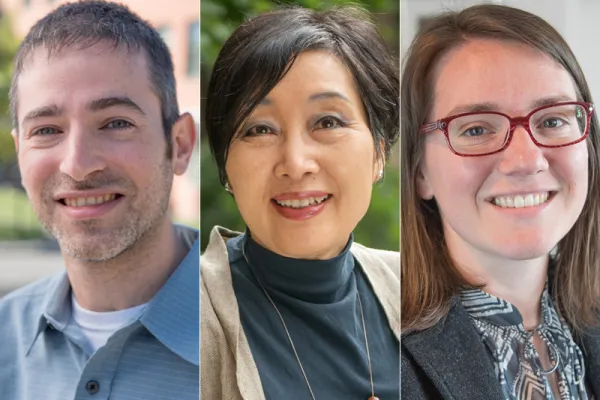Classroom Exemplars: The 2018 Sherrerd Teaching Prize Winners
Research & Inquiry

Published October 9, 2018
Associate Professor of Chemistry David Gorin says cultivating the synergy between research and teaching inspires his work with students.
For Suk Massey, a lecturer in East Asian languages and literatures, teaching is about giving back some of what she has learned from her own mentors.
In her classrooms, Tina Wildhagen, associate professor of sociology and dean of the junior class, tries to model an openness to “a certain amount of risk taking and courage.”
The three faculty members are this year’s recipients of the Kathleen Compton Sherrerd ’54 and John F. Sherrerd Prizes for Distinguished Teaching. The annual awards—established in 2002 with a bequest from the Sherrerd family—honor faculty members who show outstanding skill in fostering student learning and engagement.
Smith community members are invited to celebrate the 2018 award recipients at a ceremony Tuesday, Oct. 23, at 4:30 p.m. in the Campus Center Carroll Room. Student nominators will introduce the faculty honorees, and a reception will follow in the Wilson Atrium.
Here’s what this year’s Sherrerd Prize winners had to say about their teaching.
David Gorin, associate professor of chemistry
“My primary intellectual excitement comes from being a chemical researcher—I love moving atoms around and trying to harness that power for good. My identity as a teacher is closely tied to my identity as a scientist/scholar. I love connecting students to the ideas and concepts that fire my imagination. My starting point is to use blackboard ‘chalk talks’ to introduce concepts and problem-solving strategies. But since facts are easy to find on the Internet and are inevitably forgotten once class has ended, the most important goals for student learning are generally not content-focused. My best teaching moments are when students realize that they are getting smarter by working, sometimes uncomfortably, through complex problems. Although I initially approached teaching from a chemistry-centric perspective, I underestimated the satisfaction and sense of purpose I would feel when one of my students achieves her goals—regardless of whether chemistry plays a role. The broader academic community has a name for those who seamlessly and intentionally integrate teaching and research: ‘teacher-scholars.’ It’s a mantle I aspire to claim.”
Suk Massey, lecturer in East Asian languages and literatures
“I love teaching. Working with students is meaningful and rewarding because it provides me with opportunities to impact their lives—to help them learn and grow. My mentors taught me that the best way to pay back what we receive from our benefactors is to pass it along to others who might benefit. It has been a great privilege for me to work with students over many years at Smith—to see them open their eyes to new ways of thinking and being in the world through the study and use of Korean. Because today’s students receive information through the Internet that is diverse, dynamic and readily applicable to their lives, teachers are being challenged to adapt their courses to accommodate these new ways of understanding. In our present era, diversity of content and flexibility of method are necessary elements for effective teaching because they encourage students to cultivate their own learning potential.”
Tina Wildhagen, associate professor of sociology and dean of the junior class
“The truth is, I did not think I would love teaching—and did not love it when I started doing it as a graduate student. It wasn’t until a few years into my career that a realization hit me: Teaching is not the construction of a product that you present to students; it’s a collaborative project that students and teachers engage in together. Once I embraced that, I began to love teaching. Now, I know that at the beginning of every semester—even when I’m teaching a course I’ve taught multiple times—the work the students and I do will be different from the work of a previous semester. I see my own teaching as evolving as conditions and the needs of students change. For me, the element needed for good teaching in uncertain times is openness to both change and failure. I think that we teachers need to model for our students a certain amount of risk taking and courage. What better way to serve them as they prepare to navigate their lives after college?”
David Gorin (left), Suk Massey (center), and Tina Wildhagen (right) - Sherrerd Prize winners 2018.